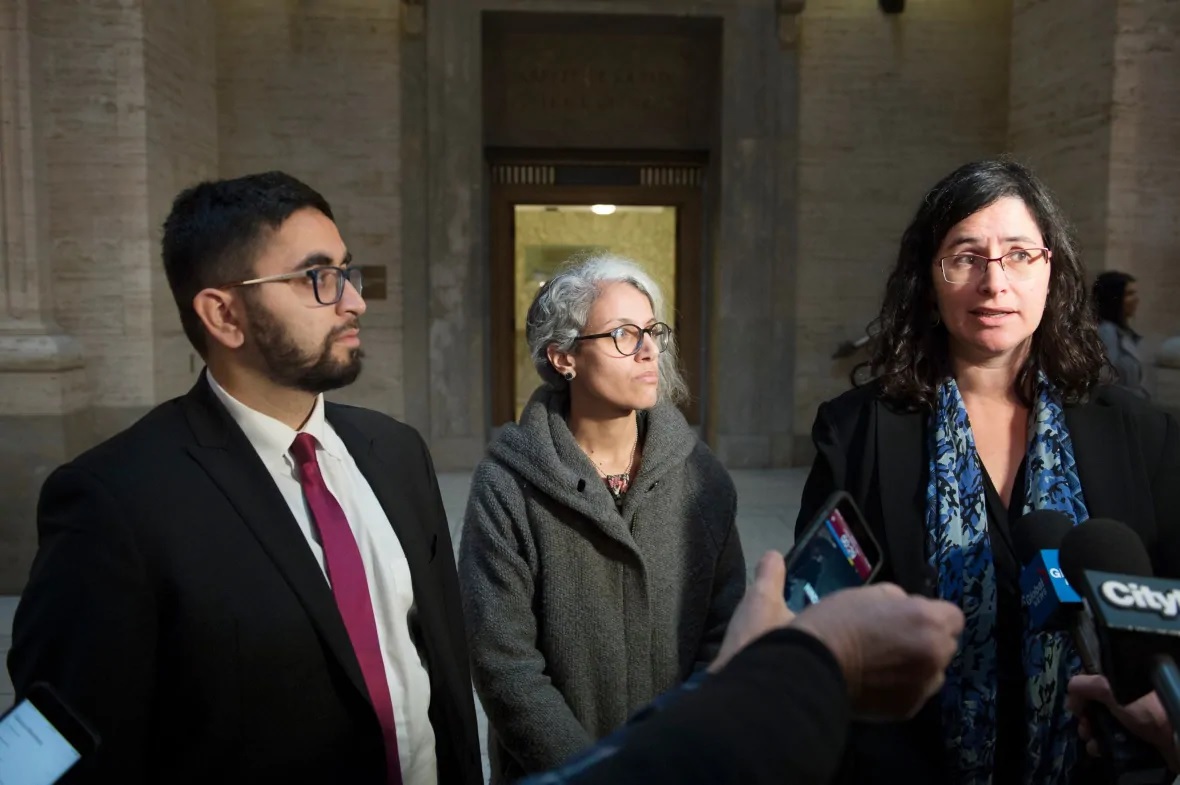A legal challenge begins today in Quebec against the province’s secularism law originally proposed as Bill 21 and which became law in June last year.
The law bans anyone from wearing visible religious symbols in public jobs. This included teachers, court officials, police and other civil servants from wearing such things as Sikh turbans, Jewish yarmulkas (kippahs), and Muslim hijabs and face veils in jobs where they have contact with the public.
A survey by the Leger firm in May of that year found 63 per cent of Quebeckers supported the law.
The proposal was the subject of several large protests both for and against in the months leading up to its passing into law. Court challenges were also launched saying it was discriminatory under Canada’s Charter of Rights and Freedoms.

Members of the National Council of Muslims Mustafa Farooq, left, and Bochra Manai, centre, and Noa Mendelsohn Aviv, a member of the Canadian Civil Liberties Association, speak to reporters at the Quebec Court of Appeal last November. The groups are among those challenging the constitutionality of Bill 21 in court. (Graham Hughes/The Canadian Press)
The Quebec government however had invoked the “notwithstanding clause” which limits Charter challenges to provincial laws for up to five years.
Subsequent challenges at the Quebec Superior Court and Court of Appeal to have the law suspended until the challenge could be heard on its merits were turned down on the basis of the notwithstanding clause. The Supreme Court of Canada said it would not hear an appeal of those decisions.
Lead by the non profit Canadian Civil Liberties Association and the National Council of Canadian Muslims, the case is being heard today by Quebec Superior Court.
It began with a protest against the law held this morning by McGill University law students outside the courthouse where the case is to be heard. They say the law is discriminatory as fellow Muslim students and other colleagues although qualified would be prevented from practicing in Quebec.

Quebec Premier Francois Legault has consistently said the law is not discriminatory and is supported by most Quebeckers ( Jacques Boissinot/The Canadian Press))
Four different challenges to the law are being combined into the one court case beginning today. Opponents say the law unfairly targets Muslim women who wear the hijab head covering. and thus the notwithstanding clause does not apply to section 28 of the Charter in which rights and freedoms are “guaranteed equally to male and female persons.”
Quoted by the CBC, Noa Mendolsohn Aviv of the CCLA said of law 21, “It’s going after Muslim women; it’s going after certain people in particular. So, it’s no longer neutral. It’s no longer secular,
The Quebec government will defend the case and will be aided by groups saying the law enforces the secular nature of the state. The government will be aided by groups who say allowing religious symbols to be worn in the classroom infringes on parents’ rights as to how their children learn about religion.
The case is expected to last several weeks.
additional information-sources







For reasons beyond our control, and for an undetermined period of time, our comment section is now closed. However, our social networks remain open to your contributions.